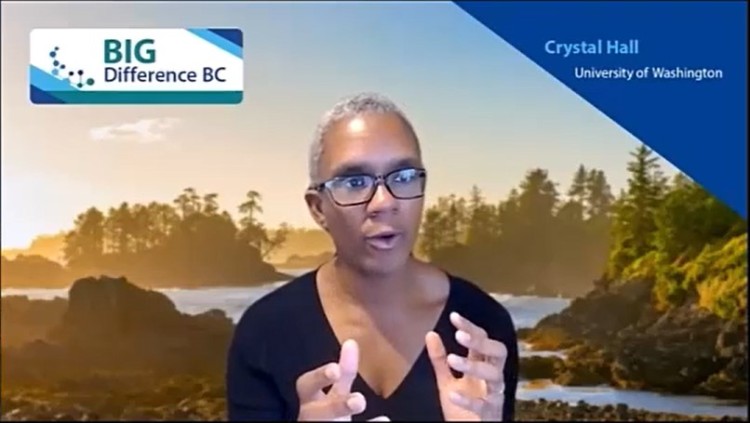
Experts gather at UBC Sauder conference to showcase how Behavioural Insights can spur long-term change in behaviour

Related Links
BIG Difference BC convened for a milestone fifth conference, continuing its legacy of bringing together scholars and business leaders to explore how human psychology, cognitive science and interventions driven by Behavioural Insights (BI) can inform better policy decisions. It put a spotlight on how BI can drive positive change—from addressing large systemic issues like racism to helping cultivate small but sustainable practices to improve household energy efficiency.
This year, the conference—co-hosted by UBC’s Decision Insights for Business and Society (UBC-DIBS), the BC Behavioural Insights Group (BC BIG), and WorkSafeBC — examined how BI can be used towards innovative solutions that shape positive, long-lasting changes in behaviour and in societies at-large.
Over 1,200 registrants from 52 countries participated in the day-long virtual event, representing educational institutions, public and private entities as well as non-profit organizations.
Kirstin Appelt, Research Director of UBC-DIBS, says this year's theme reflects how the field of BI is evolving in its efforts to affect meaningful transformation in people. “We are really excited to shine a spotlight on long-term change, because short-term change is only the start,” says Appelt. “If, for example, BI helps someone recycle today, that’s great, but the impact is somewhat small. In contrast, if BI helps someone develop a recycling habit that sticks for months or years or a lifetime, that is real, meaningful, impactful change. For BI to successfully tackle important challenges, we need to create those lasting changes in behaviour.”
Using behavioural science to tackle structural racism

Crystal Hall, Associate Professor at the University of Washington’s Evans School of Public Policy & Governance, delivered the keynote address. Hall explored how BI could help create anti-racism policies.
"In the past, behavioural science has usually focused on individuals. I wanted to talk about how we can better acknowledge and account for bigger forces—such as structural racism that affects large communities—when engaging in behavioural science," says Hall.
For Hall, this approach of using BI within the context of a collective community's interaction with their environment is key in addressing the event's theme: creating long-lasting change.
"If we really want to create deep sustained change, we have to get to the core of some of these problems. And usually that core is directly linked to big issues like structural racism."
Hall also offered solutions on how BI-driven work can be strengthened when addressing tricky policy decisions around race and racism.
"We should critically inspect our existing research practices in collecting data, and also find better ways to authentically engage with the communities that are impacted by our work," says Hall.
Hall also says BI research teams should reflect the ethnic and demographic diversity of the population they work with.
"These are places where the Behavioural Insights community can really make a lot of strides in addressing these bigger issues."
Power of BI in the laundry room
The BIG Difference BC conference also highlighted important work that's spurring favourable behavioural change within households.

David Hardisty, Associate Professor in the Marketing and Behavioural Science Division at UBC Sauder, presented research he co-led with scholars from UBC and industry practitioners from BC Hydro. In the study, Hardisty's team looked at the behavioural response of laundry users when they're nudged towards eco-friendly laundry habits—with the help of decal stickers on their washing machines.
The reminders were simple: re-wear your clothes, use cold water to wash them, and hang-dry them when possible.
"What's at stake is we have a climate emergency. So, we all need to save energy and reduce our carbon footprint.”
Hardisty's team found out that these reminders over a sustained period created a lasting, positive change in the laundry habits of users.
"It's actually difficult to change human behaviour. I'm just so happy that we actually did make a difference in people’s laundry behaviours. And hopefully it will continue on beyond this study, because we want to change the world, right?"
The power of BIG Difference BC and UBC Sauder community
The idea to do this study was conceived when Hardisty met a presenter from BC Hydro during the first year of the BIG Difference BC conference in 2018.
"This encounter proves and contributes to the reputation of BIG Difference BC; it's the leading conference on Behavioural Insights on the west coast of North America. It allows you to exchange knowledge in multiple directions, and this collaboration with BC Hydro for the laundry study is a testament to that," says Hardisty.
Crystal Hall echoes Hardisty on the power of the conference. "I have so much respect and admiration for the BIG Difference BC community,” says Hall.
"They (UBC Sauder) are such a well-respected thought leader in the Behavioural Insights space. Convening conferences such as this is one way of putting that leadership on display. They also have a great working relationship with BI units at government agencies.”
“I think that is a huge opportunity for all of us working in BI and inspiring better policy decisions."
To watch recorded video sessions from the BIG Difference BC 2022 event, click here.